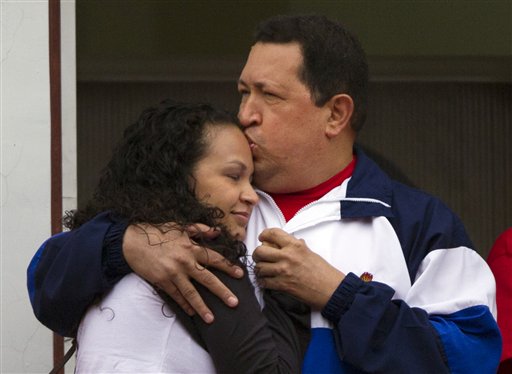By JORGE RUEDA
Associated Press
CARACAS, Venezuela
Venezuelan President Hugo Chavez is skipping the Summit of the Americas for medical reasons as cancer treatment increasingly forces him out of the international spotlight.
Venezuelan Foreign Minister Nicolas Maduro announced the decision on Saturday from Colombia, where he was attending the summit in Chavez’s place. He told state television that Chavez decided not to attend on the advice of his doctors.
The decision headed off a potential face-to-face confrontation with President Barack Obama, and also raised questions anew about the effects that Chavez’s cancer could have on his political future and his international ambitions.
Chavez has often used such regional summits as a platform to amplify his criticisms of U.S. influence and press for his vision of Latin American integration. At the 2009 Summit of the Americas in Trinidad and Tobago, Chavez took center stage when he shook Obama’s hand and gave him a book that he encouraged him to read: “Open Veins of Latin America: Five Centuries of the Pillage of a Continent,” by Uruguayan writer Eduardo Galeano.
Maduro said the president is in the midst of a “careful, disciplined treatment.”
Chavez told a crowd of supporters Friday night that the radiation therapy sessions have affected his strength but said “I’m doing well.” The president is running for re-election in October and has vowed to overcome his illness.
Chavez began radiation treatment in Cuba in late March after undergoing an operation in February that removed a second tumor from his pelvic region. He has kept secret some details of his illness, including the type of cancer and the precise location where the tumors have been removed.
Chavez said on Friday that his stay in Cuba could be lengthy.
The National Assembly held a session on Saturday to take up Chavez’s request and granted approval for the trip. Venezuela’s Constitution requires the president to obtain approval from lawmakers when leaving the country for more than five days.
Doctors say common side effects of radiation therapy include fatigue and damage to areas exposed to the radiation beams, as well as nausea and diarrhea in cases such as Chavez’s in which the pelvic area is treated.
Carrasquero said Chavez’s absence also raises questions about whether he’ll be able to make it through the presidential campaign. “What we’re watching for is when Chavez is going to announce that he’s not going to run,” Carrasquero said.
Chavez’s political allies, however, have insisted that Chavez remains their candidate and that there is no backup plan for the Oct. 7 election, when the president is seeking another six-year term.
Opposition lawmaker Edgar Zambrano said Chavez’s decision to return to Cuba is a “humanitarian issue,” and the president’s opponents joined pro-Chavez lawmakers in granting permission for the trip.
Zambrano also said, however, that even after months of cancer treatment, knowing “the magnitude of the president’s illness still hasn’t been possible for anyone.”
____
Associated Press writers Ian James and Fabiola Sanchez contributed to this report.

COMMENTS
Please let us know if you're having issues with commenting.